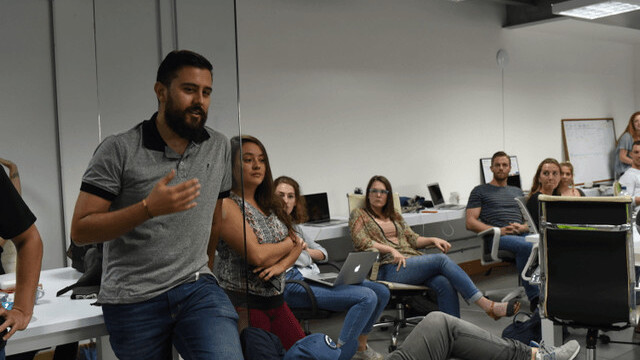
As a scaling startup, bringing on the right core team is core to company growth. It’s important to not only find people who are willing to work hard, but also who share your company’s mission and most importantly, its values.
From the outset, we decided that finding the right people meant finding not only those with the best background, but those with the right attitude and core skills to build our company. Four years later, we’re lucky to have a team which is compiled of many millennials from all corners of the globe. Our team includes Americans, Colombians, Venezuelans, French, British, Canadians, Polish, Australians and Croatians to name a few — each bringing a little of their own character and flavor from their home country.
However, despite being born thousands of miles from each other in totally different cultures, I have noticed that the majority of our millennials share characteristics that can make them a good fit to be a part of our company.
Here’s how you can make millennials a part of yours too:
Millennials value travel more than any other generation
Extensive research has shown millennials prefer experiences over things. Most recently, this has best been exemplified by the statistic that 47 percent of the demographic would rather spend money on traveling than buying a house, compared to only 26 percent of those ages 45 and older.
This same mindset has translated to the workplace. According to MMGY Global’s 2016 survey on American travelers, 81 percent of millennials actually associate business travel with higher job satisfaction, despite its negative effect on family life. As a result, the demographic was found to take more business trips than any other generation — 7.7 per year on average.
While business trips are loathed by many and sometimes seen as an impediment to productivity, for millennials the situation is quite different: business travel is both a reward and a smart investment. In a survey from TINYpulse, remote workers were found to feel happier, more valued and more productive than the average worker.

So how can you use this to your advantage with millennial employees? Give them opportunities to travel abroad for conferences, or encourage them to seek out opportunities to contribute as a speaker or mentor at international events or startup organizations. Sending employees on these types of trips can end up generating business opportunities or valuable connections for your business, in addition to keeping employee morale high.
While this might sound expensive, Wen-Wen Lam, founder of online travel platform NexTravel, told us that you don’t have to be sending your employees on business class flights. You may even be able to offer to pay for the conference fee or accommodation if the person can fit business into an existing trip. As a company, we offer to contribute to our team member’s travel expenses if they can tie in a presentation, mentorship session or client meeting into a vacation or trip.
“Millennial employees have demonstrated a strong interest in opportunities to travel abroad, and which can increase productivity and save money in the long term” says Lam. “Travel and expense is the second-largest controllable cost for most companies — second only to payroll. As more and more companies open multiple offices in different cities, investment in travel can have long term payoffs that outweigh short-term costs.”
Millennials want to collaborate using technology
Working remotely has become much more than a passing fad. A recent Gallup poll found that 43 percent of employed Americans surveyed spent some time working remotely in 2016. And the flexibility offered by remote work has actually taken on a huge role in millennials’ employment decisions. According to a FlexJobs survey from 2016, one third of millennials were found to have left a job simply because it did not offer enough flexibility.
Millennials are the ‘on the move’ generation, and have grown up surrounded by wireless technology, which has facilitated their lifestyles. Accordingly, remote communication and collaborative technologies have become more important than ever in the workplace too.
Collaborative technology is revolutionizing even the most surprising industries. Ivan Talaychuk, CEO of collaborative music platform Pibox, acknowledges that, with the proper technology at their disposal, employees can work as effectively remotely as they would in the office.

“In the music industry, mixing a track requires a lot of back and forth between the artists and the producers. Across industries, similar problems have necessitated online collaborative platforms, and for the music industry itself, moving online has actually become a more efficient solution than sitting around the studio.”
Communication is key in other industries as well. Account managers, strategists, content writers, developers and graphic designers all need to keep each other in the loop internally, by sharing information and content, and also externally when dealing with journalists and our global network of clients. One of the biggest challenges we have had is dealing with time changes when dealing with teams in different locations working together with clients all over the world.
One tool our team uses is Calendly which allows us to easily manage organizing meetings across time zones, and set up conference calls with various members in a quick, streamlined manner. We then use tools like Skype or GoToMeeting for the calls themselves. We also use a range of other tools, such as Google Docs which can be shared and edited by multiple people at the same time, and Slack which is particularly useful for reminders and even offering praise and shout outs when deserved.
Similarly, remote collaboration tools can be adopted in the office to meet the needs and expectations of your millennial workforce.
In our office, we created a “praisewall” Slack channel to celebrate the shared successes and collaborative efforts of our employees. For us, the tool has become more than an efficient communication method; it has also become a way to recognize the success of our team and acknowledge those responsible.
One benefit of having a team entirely comprised of millennials, is that we are able to try out new apps and technologies with little friction from the team. Millennials are engaged with modern technology, and experimental, and are more than happy to try out new things. Embracing collaborative technologies has also allowed us to give our employees the freedom they demand to work and travel, scratching their itch for new experiences, and enabling them to work from home. Moreover, research has shown again and again that remote working can not only boost productivity, but also increase employee satisfaction.
Millennials put social responsibility high on the priority list
Just as millennials want to enjoy a higher quality of life, they want to ensure the same for others too. This is best evidenced by their interest in social responsibility. A 2015 Cone Communications highlights this point, finding that nine out of 10 millennials would switch brands to one that was associated with a cause they cared about.
Said Microsoft’s Dan Behrendt, “Millennials want to be a part of a social and exciting work environment that also gives them purpose. They look for roles that provide the ability to deliver positively impact their community. Whether it’s via company sponsored programs that allow them to donate their time and expertise to a cause or flexible hours that allow them to teach a daytime class about their passions.”

Businesses have seen increased demands from their millennial employees. “Since 2013, when we first asked millennials about the impact business has on wider society, they have given overwhelmingly positive responses. This continues to be the case, with 76 percent now regarding business as a force for positive social impact,” reads Delloite’s 2017 Millennial Survey.
Accordingly, some businesses have built products and solutions that focus directly on solving social problems. Green Apple STEM, for example, has taken on the role of directly empowering minorities through easier access to STEM education. But that is not to say that all businesses’ core functions need to be aimed at social good. As a company we try to support charitable organizations as much as possible, and have also partnered with startup organizations in developing and emerging markets such as Chile, Colombia and Puerto Rico. Whenever we partner with a new organization, we try to get our core team involved as mentors and advisors as much as possible.
No matter what the core function of your business is, there is always an opportunity to practice social responsibility and to get your employees involved in the process. Consider giving employees the freedom to volunteer on projects they are most passionate about, or organize team volunteer projects which double as team building activities. Another idea is to offer discounts or free services to organizations and groups that matter most to your employees.
It is equally important to show social responsibility through the way you treat your employees in the office. This requires you to consider the ambience of the office — the arrangement of desks, the type of furniture, the amenities and the overall vibe. Daniel Lee, co-founder of meditation app Aura, recognizes that keeping employees relatively stress-free has its benefits.

“One of the main benefits of keeping employees’ stress levels low is that it leads to a strong company culture. Employees who aren’t struggling with extreme stress will be healthier and happier, which creates this amazing culture that’s conducive to creativity and productivity,” says Lee.
At our own company, one way we’ve looked to reduce stress is by providing the last Friday of the month off for team members. An added benefit of this, is we’ve found this provides team members with an extra opportunity to travel during the long weekend.
Although millennials have reshaped the workplace, employers can harness the new energy and use it to their advantage. On the surface, a number of millennial trends may seem like a daunting challenge to maintain productivity and profitability, but in reality, they can actually be leveraged for success.
Millennials are already the largest generation in the workforce, and the numbers are continuing to grow. With the right approach, navigating the changes they are bringing with them can be both simple and rewarding.
This article was Co-Written by Zachary Laval
Get the TNW newsletter
Get the most important tech news in your inbox each week.





